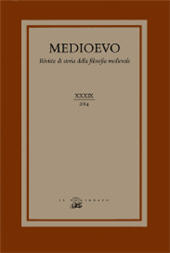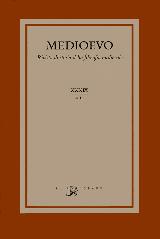La Quaestio di Stefano Langton Vtrum omnes uelint esse beati (169)
173-215 p.
Stephen Langton's quaestio Vtrum omnes uelint esse beati is a hitherto unpublished testimony of the discussion at the turn of the 12th century on the topic "if every person wants to be happy". The quaestio is marked by a remarkable dialogical dynamism and offers us a text that is certainly significant in view of the degree of development of the literary genre of the quaestio. Moreover, making a comparison with other texts on the same topic of authors contemporary with Langton, the study shows the singular destiny of Langton's quaestio in the Tractatus de Sacramentis Ex Eius Summa De Sacramentis et Officiis Ecclesiae (composed between 1215 and 1220) by Guido de Orchelles (â 1233). In Guido's tractatus 316 devoted to the topic Quid sit beatitudo, et utrum omnes uelint esse beati, Guido refers clearly to Langton's thought with the formula « nam haec fuit opinio domini Cantuariensis » and, as evidenced by this study, this is not an isolated case.
This study therefore casts new light on the underestimated destiny and impact of Langton's quaestiones among the theological works written at the turn of the 12th century, and provides an opportunity for further research through which it will be possible to give careful consideration not only to the substantial influence of Langton's thought in many sections of Guido's Tractatus but also to adjudge what manuscript material may have been available to Guido di Orchelles or what was the nature of the academic relationship between him and Stephen Langton. In an Appendix, qu. 169 - Vtrum omnes uelint esse beati is published. [Publisher's text].
La quaestio di Stefano Langton Vtrum omnes uelint esse beati è una testimonianza finora inedita della discussione a cavallo del XII secolo sul tema "se ogni persona voglia essere felice". La quaestio testimonia un rimarchevole dinamismo dialogico e ci consegna un testo certamente significativo nell'ottica del grado di sviluppo del genere letterario della quaestio. Operando inoltre sullo stesso argomento un confronto con altri testi di autori coevi al Langton, lo studio mostra la singolare fortuna della quaestio del Langton nel Tractatus de Sacramentis Ex Eius Summa De Sacramentis et Officiis Ecclesiae (composta tra il 1215 e il 1220) di Guido de Orchelles (â 1233). In particolare nel tractatus 316 di Guido dedicato al tema Quid sit beatitudo, et utrum omnes uelint esse beati, Guido fa un chiaro riferimento al pensiero del Langton attraverso la formula «nam haec fuit opinio domini Cantuariensis». Ma, come dimostra questo studio, non si tratta tuttavia di un caso isolato.
Nuova luce è perciò gettata sulla ancora sottostimata fortuna ed impatto delle quaestiones di Langton nelle opere teologiche scritte a cavallo del XII secolo. Questo studio pertanto offre l'occasione per ulteriori ricerche attraverso le quali si potrà valutare attentamente non solo l'influenza del pensiero di Langton in molte parti del Tractatus ma anche quale eventuale materiale avesse tra le mani Guido di Orchelles o quale tipo di rapporto accademico intercorresse tra lui e Stefano Langton. In appendice, la qu. 169 - Vtrum omnes uelint esse beati è editata criticamente. [Testo dell'editore].
-
Articles du même numéro (disponibles individuellement)
-
Informations
ISBN: 9788893871099
ISSN: 2704-7083



